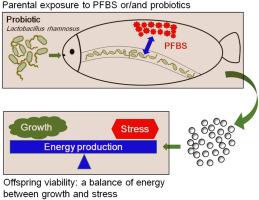Ecotoxicology and Environmental Safety ( IF 6.2 ) Pub Date : 2021-03-02 , DOI: 10.1016/j.ecoenv.2021.112107 Mengyuan Liu , Lizhu Tang , Chenyan Hu , Baili Sun , Zileng Huang , Lianguo Chen

|
Perfluorobutanesulfonate (PFBS) pollutant and probiotic bacteria can interact to affect the reproductive outcomes of zebrafish. However, it is still unexplored how the growth and health of offspring are modulated by the combination of PFBS and probiotic. In the present study, adult zebrafish were exposed to 0 and 10 μg/L PFBS for 40 days, with or without dietary supplementation of probiotic Lactobacillus rhamnosus. After parental exposure, the development, growth and viability of offspring larvae were examined, with the integration of molecular clues across proteome fingerprint, growth hormone/insulin-like growth factor (GH/IGF) axis, calcium homeostasis, hypothalamic-pituitary-adrenal (HPA) axis and nutrient metabolism. Parental probiotic supplementation significantly increased the body weight and body length of offspring larvae. Despite the spiking of PFBS, larvae from the combined exposure group still had longer body length. RNA processing and ribosomal assembly pathways may underlie the enhancement of offspring growth by probiotic bacteria. However, the presence of PFBS remarkably increased the concentrations of cortisol hormone in offspring larvae as means to cope with the xenobiotic stress, which required more energy production. As evidenced by the proteomic analysis, the addition of probiotic bacteria likely alleviated the energy metabolism disorders of PFBS, thus allocating more energy for the larval offspring growth from the combined group. It was noteworthy that multiple molecular disturbances caused by PFBS were antagonized by probiotic additive. Overall, the present study elucidated the intergenerational interaction between PFBS and probiotic on offspring growth and health after parental exposure.
中文翻译:

益生菌添加剂与全氟丁烷磺酸盐污染物之间的相互作用对斑马鱼父母接触后代的生长和健康的影响
全氟丁烷磺酸盐(PFBS)污染物和益生菌可以相互作用,影响斑马鱼的繁殖结果。但是,如何通过PFBS和益生菌的组合来调节后代的生长和健康尚待探索。在本研究中,成年斑马鱼暴露于0和10μg/ L PFBS 40天,有或没有膳食补充益生菌鼠李糖乳杆菌。父母暴露后,检查了后代幼虫的发育,生长和生存力,并结合了蛋白质组指纹图谱,生长激素/胰岛素样生长因子(GH / IGF)轴,钙稳态,下丘脑-垂体-肾上腺( HPA)轴和营养物质代谢。父母补充益生菌会显着增加后代幼虫的体重和体长。尽管PFBS出现了尖峰,但联合暴露组的幼虫仍具有较长的体长。RNA加工和核糖体装配途径可能是益生菌增强后代生长的基础。然而,PFBS的存在显着增加了后代幼虫中皮质醇激素的浓度,作为应对异种生物压力的手段,这需要更多的能量产生。正如蛋白质组学分析所证明的,添加益生菌可能会减轻PFBS的能量代谢紊乱,从而为合并后的幼虫后代的生长分配更多的能量。值得注意的是,益生菌添加剂可拮抗PFBS引起的多种分子干扰。总体而言,本研究阐明了PFBS和益生菌之间的代际相互作用对父母暴露后代的生长和健康的影响。











































 京公网安备 11010802027423号
京公网安备 11010802027423号